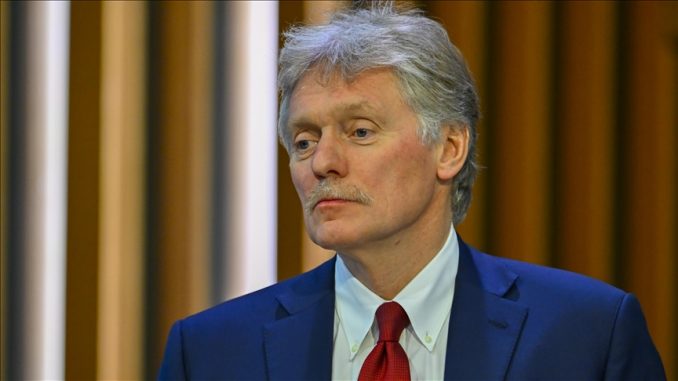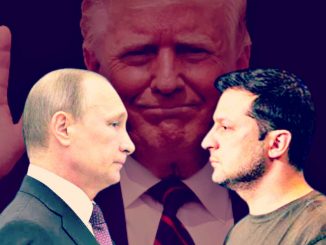
Published September 12, 2025
Spokesman Dmitry Peskov says in ‘normal conditions,’ Western countries would observe Russian military drills without getting ’emotionally charged’
The Kremlin announced that negotiations between Russia and Ukraine are currently on hold, though communication channels remain open. Kremlin spokesperson Dmitry Peskov stated that “it is probably more accurate to say that there is a pause,” emphasizing that the dialogue has not been terminated entirely.
According to Russian officials, three rounds of direct talks were held in Istanbul earlier this year, with the most recent on July 23. These meetings produced limited humanitarian outcomes, including prisoner exchanges and the repatriation of soldiers’ bodies. However, they failed to make progress on larger political questions about a potential peace settlement.
Moscow accused European countries of obstructing the talks, pointing specifically to proposals for security guarantees to Ukraine that could involve the presence of NATO troops on Ukrainian territory after any agreement. Russia maintains that such guarantees are unacceptable.
Ukraine, for its part, has suggested that Moscow may be using negotiations as a tactic while continuing military operations. Despite the pause, both sides continue to maintain certain channels of communication to handle specific issues.
 Interpretation and Possible Implications
Interpretation and Possible Implications
Here are some likely implications and interpretations of what’s going on, and what “on pause” might mean in practice.
-
Tactical pause vs. strategic breakdown
A pause doesn’t necessarily mean negotiations are dead; it could mean both sides are regrouping, reassessing positions, or waiting for favorable external developments (e.g. military, diplomatic, or domestic political) before resuming. -
Europe’s role under scrutiny
Russia’s claim that Europe is “hindering” talks suggests that Moscow wants to shift blame externally and/or to pull Europe (especially NATO or EU states) deeper into the narrative. It might also be an attempt to shape public opinion: making Europe appear as an obstacle to peace. -
Security guarantees are a major sticking point
If European/NATO involvement is part of post-settlement guarantees, it challenges Russia’s core security concerns (or its perception of them). Russia insisting that this is unacceptable signals low willingness to accept strong external oversight or enforcement mechanisms. -
Trust / credibility issues
Ukraine (and some of its backers) may perceive that Russia is delaying while continuing military pressure, using negotiations as a tool rather than aiming seriously for compromise. This reduces trust and makes agreement harder. -
Domestic political pressures in Russia and Ukraine
Each side has constituencies with different thresholds: Ukrainian domestic pressure for peace vs. territorial integrity; Russian domestic narratives about security, “realities on the ground,” etc. These pressures affect flexibility. -
Effect on international diplomatic dynamics
The pause may lead Ukraine to seek alternative diplomatic strategies or lean more heavily on its allies. Europe will be under pressure to clarify what it is willing to guarantee, and how those guarantees could be credible without triggering escalation from Russia. -
Risk of escalation elsewhere
If negotiations remain paused or collapse, the risk of military escalation increases – either on the battlefield, or via proxy / indirect fronts. Conversely, a pause might reduce immediate diplomatic costs but could lead to stagnation in conflict resolution.
 Overall Takeaway:
Overall Takeaway:
The Kremlin’s announcement that Russia-Ukraine talks are “on pause” underscores how fragile and uncertain the search for peace remains. While Moscow frames the interruption as a response to Europe’s alleged interference—particularly over NATO-linked security guarantees—the deeper issue is the enormous gulf in what each side considers an acceptable outcome. For Ukraine, any settlement that undermines its sovereignty or territorial integrity risks domestic backlash and further instability. For Russia, any deal that legitimizes NATO’s presence on Ukrainian soil represents an existential red line.
The pause, therefore, is less a temporary halt than a reflection of the strategic impasse. Both governments are pursuing negotiations selectively: Ukraine seeks relief for humanitarian issues such as prisoner exchanges, while Russia uses the talks to project openness while keeping its long-term military and political aims intact. In this sense, the diplomatic track remains subordinate to battlefield realities, where progress—or setbacks—will likely determine when and how negotiations resume.
For Europe, being cast as an obstacle by Moscow is a warning that its growing security role in Ukraine will be fiercely contested. Yet for Kyiv, European support is not optional but essential, both for its survival and for any credible future peace deal. The gap between these opposing imperatives may prove the defining barrier to genuine resolution.
In the end, the “pause” may be less about time than about leverage. Both Russia and Ukraine appear to be waiting for conditions to shift in their favor, whether militarily, diplomatically, or politically. Until then, peace remains a distant prospect, hostage to competing visions of security in Eastern Europe—and to the wider struggle over the future balance of power on the continent.
SOURCES: REUTERS – Kremlin says Russia-Ukraine talks are paused, accuses Europe of hindering them
ANADOLU AJANSI – Kremlin says communications between Russia and Ukraine ‘on pause’
THE KYIV INDEPENDENT – Ukraine-Russia peace talks on ‘pause,’ Kremlin says





Be the first to comment